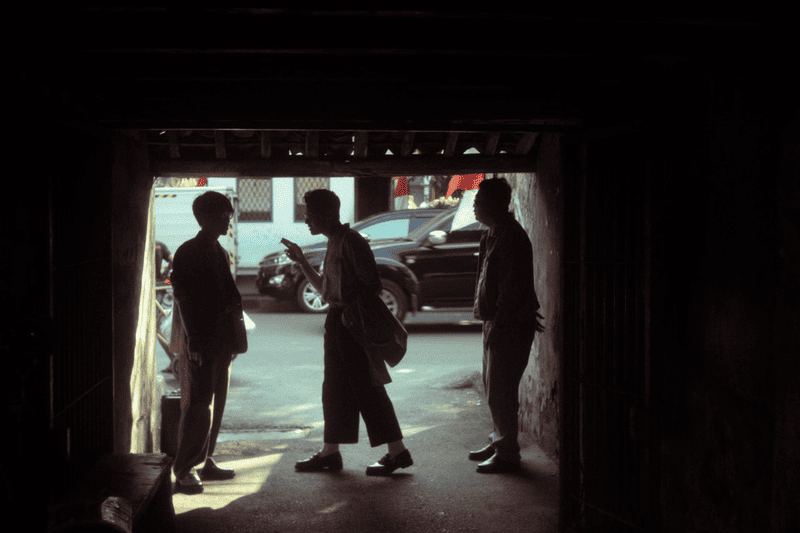Its short length might leave listeners wanting more, but this pop trinity proves that some creative magic can only be accomplished by an indubitable chemistry.
So far, the year 2025 in the Indonesian music industry has kicked off to a pretty interesting start. Several musicians have made it clear, as evidenced by their recent releases, that this time around, they wanted to inject a jolt of energy into the airwaves. Furthermore, the chart-topping success of Tenxi, Jemsii, and Naykilla’s hip hop-dangdut marriage “Garam & Madu (Sakit Dadaku)” suggests that a jolt of energy is also what the Indonesian music audiences want right now. Goodbye, galau ballads. Hello, infectious bops.
In many ways, timing has graced Wijaya 80 — a pop trio-slash-band consisting of Ardhito Pramono, Erikson Jayanto, and Hezky Joe — with the ideal setup to introduce its debut EP, Perjumpaan. It doesn’t hurt, either, that the band’s recent single, “Terakhir Kali”, has recently joined the ranks of one of this year’s early sleeper hits. Still and all, the quality of the song’s parent album (or, in this case, the song’s parent EP) is going to be what decides whether Wijaya 80 is only here for a moment or a true force to be reckoned with. And luckily, this EP has more than just one infectious bop.
Putting the EP’s strongest tracks as the opening (“Anak Muda”) and the closing (“Terakhir Kali”) number is usually a move that entails a bigger risk than a bigger reward — the risk, usually, is how the listeners would be tempted to skip all the songs in between. However, in the case of Perjumpaan, the tracklist arrangement works. “Anak Muda” makes for a near-perfect musical appetiser thanks to its frisky energy. Yes, the number’s music production and lyrical linguistics pretty much scream 80s (which is, from the get-go, what Wijaya 80’s discography has been all about), but the band’s sonic commitment is merely the icing on the cake.
With the head-spinning “Anak Muda”, Wijaya 80 showcases, without further ado, its understanding that what ultimately makes the 1980s both a decade and a music subgenre of its own is the energy, which commands a level of rambunctious urgency that could only be experienced by anyone who had faced the beginning of the end of a certain millennium. Wijaya 80 might not literally spend its adolescent years in the 1980s, but this particular trinity sure understands what it might have felt like.
The take-no-prisoners energy continues with “Pemain Lama”, which is practically a showcase of how well-executed male vocal harmonies can stand toe to toe against the 20th-century girl groups. Hezky Joe’s smooth-and-silky baritone intertwines in a deliciously melodious back-and-forth with Ardhito Pramono’s soft-spoken timbre, as Erikson Jayanto’s masterful keys and synth manage to fill in the blanks without taking over the entire song. The trio slows things down a little bit with “Masih Ada Kamu” without compromising the momentum first established in “Anak Muda”, proving that there is more than one way to dish up a slow-burning, romantic ballad.
But perhaps what is ultimately the EP’s pièce de déclaration is how, despite the changing times, a united front can still give birth to an art that is more impressively muscular. In the modern industry landscape where (let’s be brutally honest here) younger aspiring talents still see being a soloist as preferable to being a part of a band or a group, Perjumpaan deftly demonstrates what can happen when a triangle of creative sparks triumphs over practical individualism. As talented as the MLD Jazz Project-breakout Hezky Joe is, Ardhito Pramono’s natural presence helps turn “Seharusnya Aku” into a chef’s kiss of a broken-hearted man’s elegy — perfect for Erikson Jayanto’s prismatic production. “Terakhir Kali” effectively captures a collective aggravation, underlining how heartbreak, when conveyed by a synchronized triad, can ironically become what brings people together.
That being said, Perjumpaan bows to the crowd with one little, easier-to-accept creative dilemma and another, more complicated one. The first creative dilemma is the so-called ‘outtakes’ number, “Jangan Datang Lagi”, which feels like such a missed opportunity considering it already possesses a strong hook, to begin with. If only Wijaya 80 had whisked this number into a properly produced tune, “Jangan Datang Lagi” could have been a brooding showstopper that pairs nicely with the already fan-favourite “Terakhir Kali”.
The other, more complicated creative dilemma is the fact that Perjumpaan is an EP that ‘only’ consists of six songs. While the EP is impressively executed, due to its length of time, Perjumpaan feels like a very short-lived encounter. However, it would have also been dangerous to ‘force’ Perjumpaan into becoming a full-length LP. After all, the delicate risk of channelling nostalgic sounds is that, if the musicians in question take it way too far (like what Salma Salsabil did with her debut album, another retro-flavoured Berharap Pada Timur), the record could have ended up sounding tedious and overbearing. There is a fine line between ‘fresh nostalgia’ and being downright ‘trapped in the past’. Perhaps, for all its charm as well as its imperfections, the six-track Perjumpaan is all that Wijaya 80 can readily offer (for now).

But will Perjumpaan create an affecting impression in the music industry as well as the music audiences’ radar? Well, I’m afraid the jury might still be out for this one. The momentum might be on Wijaya 80’s side right now, but once the dust settles, the question “Why 80s, though?” might continue to linger in the minds of some music audiences. The more cynical audiences might even go so far as to dismiss Perjumpaan as nothing more than a ‘passion project’. That’s the harsh reality of being a musician — either in 1985 or in 2025, making good music is merely the first step of (what we can hope to be) a very long career. But as long as these three gentlemen have each other’s back, perhaps this lovable encounter will lead to something more.
All images are courtesy of Wijaya 80 / Wijaya Records.




